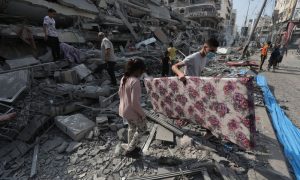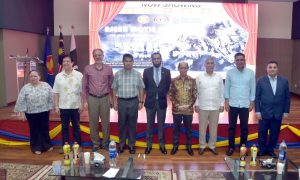BAGHDAD, Iraq: Iraq’s Tigris and Euphrates rivers, once symbols of abundance and vitality, are now victims of pollution, sewage, and neglect, exacerbating the country’s water crisis. Stricken by drought and impacted by upstream dams, these historic waterways are suffocating under a deluge of pollutants, ranging from sewage to medical waste.
Government institutions, entrusted with safeguarding Iraq’s natural resources, are complicit in this environmental catastrophe. Khaled Shamal, spokesperson for the Ministry of Water Resources, pointed out that sewage networks indiscriminately discharge untreated wastewater into the rivers, contributing to their contamination. Furthermore, hospitals, instead of properly disposing of medical waste, directly dump it into the rivers, posing significant health risks to the population.
The consequences of water pollution are dire. In a country where half the population lacks access to safe drinking water, according to UN estimates, contaminated water sources pose a severe health threat. Petrochemical factories, power plants, and agricultural runoff further degrade water quality, exacerbating the problem.
Visible signs of pollution, such as green-colored water and foul odors, are now commonplace in Iraq’s waterways. The situation is particularly dire in Baghdad, where overburdened water treatment plants struggle to meet the needs of a rapidly growing population. Despite efforts to improve infrastructure and regulations, inadequate facilities and limited public awareness continue to undermine water quality.
In response to the crisis, the Iraqi government has initiated measures to address water pollution. Projects with potential to contribute to pollution are now required to include water treatment provisions, and a three-year plan aims to strengthen the water and sanitation system, prioritizing vulnerable communities. Collaborative efforts with international organizations, such as UNICEF, have led to the establishment of water treatment facilities in critical institutions like Baghdad’s Medical City.
However, challenges persist. Iraq’s vulnerability to climate change, compounded by upstream dam constructions by neighboring countries, exacerbates water scarcity and pollution. Efforts to dilute pollutants by increasing river flow are hampered by reduced water levels, necessitating alternative strategies. Despite ongoing efforts to mitigate pollution, significant obstacles remain, particularly in regions like southern Iraq, where water pollution is most acute.
For communities like those in Dhi Qar province, access to clean water is a daily struggle. With rivers contaminated and traditional water sources compromised, residents are forced to rely on alternative, often costly, water sources for their basic needs. As Iraq grapples with its water crisis, urgent action is needed to address pollution, safeguard public health, and ensure access to clean water for all citizens.























